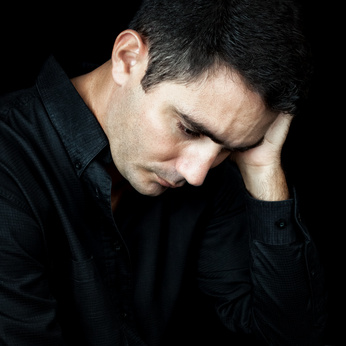
“Anxuous Man” Image License: XS courtesy kmiragaya
Anxiety is a general sense of worry or fear. Everyone feels anxious now and then, more so for upcoming big events. Like an approaching wedding, perhaps. Or an interview, or a big test.
In such instances, it’s just our body preparing us for the forthcoming event, by releasing hormones which it believes are necessary to face that occasion. Such anxiety is normal, and in most cases, will pass soon after the event.
But what if those hormones are released into our system for no apparent reason? Then we may begin to feel worried and tense, with no obvious explanation for feeling that way.
We may stay on alert anticipating some kind of threat or change, although we cannot pinpoint what it may be. We may think it could be our health, and end up going through a bunch of tests. Or we may perhaps worry that our family is in some kind of danger. Or that we may run out of money.
If such a worry has become a constant part of our life, then that means our anxiety has progressed from being a normal feeling to being a disorder.
SYMPTOMS OF ANXIETY DISORDER
While we may know what is anxiety disorder, the more important question is – how do you ascertain whether you have an anxiety disorder?
Ask yourself these questions:
- Are you constantly on the edge? Is your mind constantly racing? Do you have a hard time calming yourself down?
- Do you feel worried, uneasy or tense most of the time? Do you find it difficult to concentrate or sleep because of this feeling?
- Have you been feeling irritable or angry lately, with no possible explanation for being so?
- How about your level of alertness? Is it unduly high? Does every little noise startle you?
- And most importantly, are these thoughts and feelings interfering with your daily routine? Are they affecting your work, your productivity, your relationships?
If you answered ‘Yes’ to above, it is very likely you may be suffering from anxiety bordering a disorder.
Anxiety Disorder is this constant feeling of worry or fear, with no clear or obvious reason for feeling that way.
And it’s quite possible that this internal turmoil may not show on your face. In other words, you may appear quite normal to the person next to you.
But there are several physical symptoms that you may likely be experiencing inside – a racing heart, faster breathing, sweating, dizziness, stomach knots and tensed muscles. You may experience a loss of appetite, a headache, or even achest pain.
WHAT CAUSES SUCH AN ANXIETY DISORDER?
There is no one specific reason – it could range from genetics to events that occurred in one’s past. In particular, those that have experienced stressful life events in their past – like abuse, death of a loved one, or divorce – are more likely to suffer from an anxiety disorder in future.
TYPES OF ANXIETY DISORDER
Now that we know what is anxiety disorder, here is a quick look at some of the common types of anxiety disorders:
1. GENERALIZED ANXIETY DISORDER
Generalized Anxiety Disorder or GAD is typified by the constant worry without any apparent reason, as mentioned in preceding paragraphs.
2. PANIC DISORDER
Panic Disorder is characterized by sudden feelings of intense anxiety and fear, lasting from a few minutes to few hours.
3. SOCIAL ANXIETY DISORDER
Social Anxiety Disorder is a social phobia involving overwhelming fear of facing social situations.
4. OBSESSIVE COMPULSIVE DISORDER
OCD is an anxiety disorder causing people to perform certain actions repetitively, owing to few inherent fears.
5. POST-TRAUMATIC STRESS DISORDER
PTSD, as the name implies, is a condition that is usually developed on account of a past trauma.
We hope this page answers your questions on anxiety, and what an anxiety disorder is. If you suspect you or your loved one suffers from any of these anxiety disorders, please seek professional help as soon as possible.
[quads id=1]


